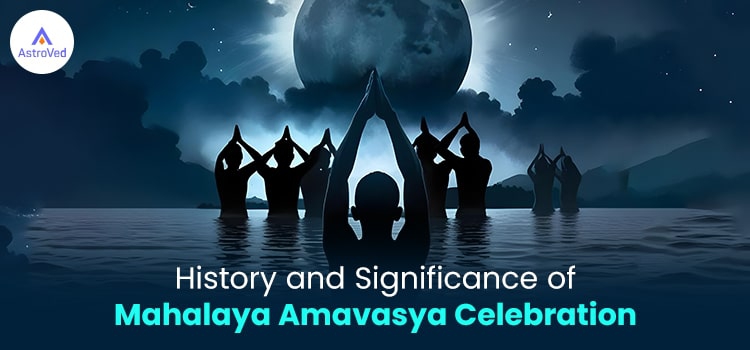History and Significance of Mahalaya Amavasya Celebration
The new moon day or Amavasya in the Tamil month of Purattasi is called the Mahalaya Amavasai. Mahalaya Paksha is a 16-day period that begins from the first day of the full moon, which falls before the Purattasi new moon.
During Mahalaya Paksha, the souls of the deceased descend to earth from the world of the ancestors or Pitrus to see their descendants. Hindus perform rituals like Shraddh and Tarpan to appease their souls and bring them peace and Moksha. Some also observe a fast on the day of the new moon and give alms to the needy.
According to the Shastras, our present life is a continuation of our past life. It is also the preparation for our future life. Hindus believe that people die and are reborn on earth. We owe our lives to our ancestors.
‘Maha’ refers to “highest” or “greatest” and Laya means ‘being in alignment or oneness’. During Mahalaya Amavasya, the energy in Nature, which enables human beings to experience oneness with the divine, is at its zenith. Hence, Mahalaya Amavasya is the best time to respect the ancestors who have contributed to our present life. Our ancestors may have done good and bad karma. On this auspicious day, we can help them to raise their energy, so that their bad karma is removed, and they can have a good life when they are reborn on earth.

Karna and Mahalaya Paksha
A story from the Mahabharata explains the importance of Mahalaya Amavasya. Karna, who was renowned for his donations and charities, reached heaven after he died in the Kurukshetra war. However, whenever he was hungry or thirsty, he was offered only gold, silver, and other gems and not food or water. The reason – he did not make any offerings to his ancestors, as he did not know who they were. So, he got permission from Lord Yama to return to earth and find and honor his ancestors during the 15-day period of Mahalaya Paksha.
All Hindus are born with five types of debts (pancha maha yajnas). These must be repaid during their lifetime.
These debts are:
-
Rishi Yajna or Veda Yajna
The Rishis gave us the knowledge of the Vedas and this great culture. By reading the Vedas and Puranas and following their teachings, we can repay this debt.
2. Deva Yajna
We owe this debt to the gods, who are helping us in many subtle ways. To repay their debt, we can chant Mantras and perform Poojas.
3. Pitru Yajna
This is the debt to our ancestors/Pitrus. We must repay it by remembering them and performing certain rituals during this special fortnight.
4. Bhuta Yajna
This is our debt to Nature and everything in it — the soil, the rivers, the plants, etc. To repay it, we take care of the land, the trees, the rivers, the birds, and other animals. Hence, one of the daily routines of a Hindu is to water plants, offer food and water to birds, and feed some animal before eating their own food.
4. Manushya Yajna
The last is the debt to humanity. We can repay it by doing acts of charity. For this reason, guests, especially uninvited guests, are treated like gods and always given whatever they need.
Significance of Mahalaya Paksha
When Pitru Paksha begins, the Sun enters the Libra (Tula) sign. At this time, the ancestral souls leave pitru–loka and visit their descendants’ homes. They reside there for a month, till the Sun enters Scorpio (Vrichchhika) on the day of Purnima or the full moon. We should appease our ancestors in the first half, during Krishna Paksha, the dark fortnight. This is when they are closest to us. After that, they will depart, so they will be very pleased if we honor them at this time. If they are pleased, they will give us their blessings. The blessings of ancestors can bring good luck.
On the day of the Mahalaya Amavasya, the pitrus return to Pitru Loka. Hence, on that day, we should honor and worship them before sending them on their way.
We should also perform acts of charity, such as Anna daan (offering food to the needy), during this period, especially on the new moon day. This can help us repay the debts we owe to our ancestors and other people. Relatives of the deceased, such as sons, daughters, grandsons, granddaughters, great-grandsons, wives, sons-in-law, brothers, etc., can perform Shraddh for the late ancestors. Of all the charities one can do during these fifteen days, Anna Daan is the greatest.
Auspicious activities like marriages and celebrations are not held during this period. By observing this ritual, we can enjoy a good, healthy, and peaceful life. All children should conduct these rites for their ancestors and parents.



















